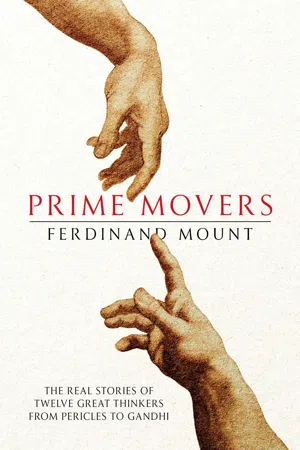
- 416 pages
- English
- ePUB (mobile friendly)
- Available on iOS & Android
Prime Movers
About this book
Ferdinand Mount has been fascinated by the great thinkers and politicians who have shaped human history over the past two millennia In this fascinating, and provocative book, he examines the proposals for a political theory from a number of widely different historical figures. Twelve key people, from the great orator and statesman of Ancient Greece ( Pericles ) to the inspiration of the founding of the state of Pakistan ( Muhammad Iqbal ) we take a colourful and rip-roaring journey through the historical figures who have both inspired and provoked Mount in equal measure. The lives of men such as Jesus Christ, Rousseau, Adam Smith, Edmund Burke, and Thomas Jefferson are discussed and comparisons are drawn between the various approaches each figure promoted in their works – whether philosophical, or political theories. For those wishing to be guided by Mount's choices and be swept along by his brilliantly erudite prose, this will be a particular enjoyable read. Lots of colour, humour and passion governed all these peoplecareersand Mount brings them to life like no one else can. Praise for the international-bestselling Tears of the Rajas: - 'Mount is a skilled and fluent writer who does his subject justice' -- Literary Review 'Mount relates this remarkable story with a gentle wit, a lightness of touch, a boyish enthusiasm as well as a genius for the telling pen-portrait… It is a remarkable story, and cumulatively amounts to an epic panorama of British Indian history much more substantial than the 'collection of Indian tales, a human jungle book', which Mount modestly describes as his aim in the introduction.' -- William Dalrymple, The Spectator 'What [Mount] provides instead is of far greater value: a perceptive antidote to nationalistic prejudicial thinking, and an opportunity for a greater understanding of the aftereffects of British imperialism in some of the world's most troubled regions.' Sunday Times 'Although Tears of the Rajas is replete with stirring tales of adventure, it is a deeply humane book. Mount's heart is at all times with the people of India, whose lives are turned upside down by blundering attempts at modernisation.' The Times
Tools to learn more effectively

Saving Books

Keyword Search

Annotating Text

Listen to it instead
Information
INDEX
Table of contents
- Cover
- Dedication
- Epigraph
- Introduction: The fatal blandishing
- I Pericles (495 BC–429 BC) and the invention of democracy
- II Jesus (7/2 BC–AD 30/33) and the brotherhood of man
- III Jean-Jacques Rousseau (1712–78) and the self supreme
- IV Adam Smith (1723–90) and the invisible hand
- V Edmund Burke (1729–97) and the stickiness of society
- VI Thomas Jefferson (1743–1826) and the endless revolution
- VII Jeremy Bentham (1748–1832) and the management of happiness
- VIII Mary Wollstonecraft (1759–97) and the rights of woman – and men too
- IX Giuseppe Mazzini (1805–72) and the religion of nationhood
- X Karl Marx (1818–83) and the death of capitalism
- XI Mohandas Gandhi (1869–1948) and the non-violent path
- XII Muhammad Iqbal (1877–1938) and the dream of Islam
- Finale: In praise of trade-off
- List of Illustrations
- Acknowledgements
- Select Bibliography
- Index
- Copyright
Frequently asked questions
- Essential is ideal for learners and professionals who enjoy exploring a wide range of subjects. Access the Essential Library with 800,000+ trusted titles and best-sellers across business, personal growth, and the humanities. Includes unlimited reading time and Standard Read Aloud voice.
- Complete: Perfect for advanced learners and researchers needing full, unrestricted access. Unlock 1.4M+ books across hundreds of subjects, including academic and specialized titles. The Complete Plan also includes advanced features like Premium Read Aloud and Research Assistant.
Please note we cannot support devices running on iOS 13 and Android 7 or earlier. Learn more about using the app